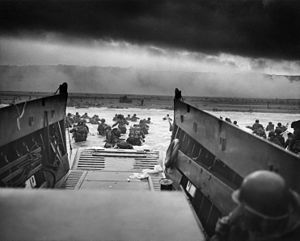 On this 70th anniversary of D-Day it seems fitting to repost an earlier offering from the series Saturday Study Hall – “Vincent and Peace Today”
On this 70th anniversary of D-Day it seems fitting to repost an earlier offering from the series Saturday Study Hall – “Vincent and Peace Today”
Ukraine, Crimea, Syria, Palestine – our eyes glaze over… or shut in horror. We long for peace but it seems to many to be further away than ever in recent years. Our times are not the best of times.
Vincent lived in similar times. “With the exception of some brief periods of time, the seventeenth century in which Saint Vincent lived was a century of wars: sequels to religious war, heart rending civil wars complicated by foreign wars, and continued threats from Islam (threats directed toward Christianity).”
Just because it was over three centuries ago and society was perhaps less complex does not mean we can not learn from a study of Vincent and Peace.
Those on the margins of society are too often “collateral damage”.
In a thoughtful article Vincent and Peace, David Carmona writes “Saint Vincent, who had dedicated his life to the poor, had to be especially concerned about those persons who were overwhelmed by the war.”
Contents and excerpts
1 Peace in the Seventeenth Century
“With the exception of some brief periods of time, the seventeenth century in which Saint Vincent lived was a century of wars: sequels to religious war, heart rending civil wars complicated by foreign wars, and continued threats from Islam (threats directed toward Christianity).”
3.2 To assist those in need
3.3 Assistance according to need
3.4 Supervise the charitable works
—what is your personal reaction when confronted with a situation of violence?Blessed are the peacemakers
—How do I behave toward individuals who are foreigners, immigrants?
—How do I behave toward those who think differently than I do
—Am I tolerant and do I seek to enter into dialogue with such individuals?
—Do I forgive those who have wronged me?
—Do I embrace the future?
Various NGO’s and individuals seek to know and understand the root causes of conflict and thus commit themselves to the transformation of our world.
—Am I sensitive to the reality of violence and do I attempt to sensitize others?
—Do I participate with other groups and/or individuals in trying to know and understand the root causes of violence?—In what ways can I commit myself to the cause of peace?
If you only have time for one section read the one related to the above question that caught your attention.





0 Comments